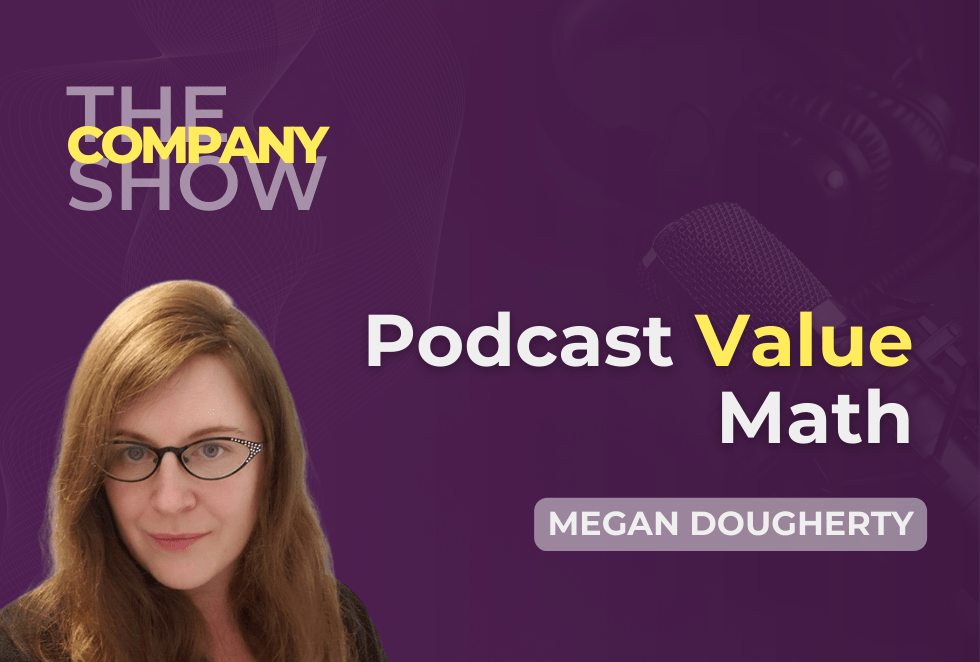I’ve been looking forward to this episode all year.
I am absolutely thrilled to share that my book, Podcasting for Business, is officially available for pre-order!
This book has been percolating in the back of my brain for years, and now, with the help of an amazing book coach, Amy Collette of Unleash Your Inner Author, it’s ready to go.
The official launch date is on September 10th, and I have some fun things planned between then and now – but today, I wanted to share one of my absolute favorite chapters with you.
All right- the excerpt is coming right up, but first I wanted to tell you where and how you can pre-order the book in case you simply cannot wait.
It’s all at PodcastingforBusiness.com/Book – along with the details about how to turn your pre-order into a free ticket to the Podcasting for Business Conference!
And now, for podcast value math, listen below or continue reading the blog post:
Tune in to the full episode and learn:
- What podcast value math is
- How to identify what’s valuable,
- which part of the show is creating that value,
- and what you should do to increase that.
My book, Podcasting for Business is coming out this September — learn more about it here.
What is Podcast Value Math?
Have you ever heard that quote from Peter Drucker, “You can’t improve what you don’t measure?”
I couldn’t agree with it more. In order to make something better, you have to know what your baseline and your goals are. Without good measurement, you won’t be able to accurately identify how far you’ve come.
This is the principle that underlays the entire Business Podcast Blueprints Concept.
Your podcast can be tweaked and refined to provide specific business outcomes in a way you can clearly measure.
I call this Podcast Value Math.
The first variable is the value: what makes podcasting valuable to you?
The second is the specific parts of your podcast that create or facilitate that value.
The final variable, or perhaps it would be more correct to say the notation, the plus and minus, and multiplication signs, is the actions you take to alter your show to change the value it creates and how.
The result is the amount of value being created. In other words, how much of what you want is the podcast generating?
In this book, I’ve done the podcast value math for 15 different metrics, (business outcomes) you might want to optimize for, so you can take them and run. But I also want you to understand the thinking that went into them so you can optimize your podcast for whatever it is you happen to want.
Let’s go through each of the variables in more detail.
Variable 1: What is the Value?

First of all – what is value for you in the context of podcasting?
Well, it’s up to you.
Value can be anything you want it to be.
Most of the work I do at One Stone Creative and Podcasting for Business, and what you’ll find in this book, revolves around business value – things like sales cycle length, number of referrals, promotional opportunities, SEO and labor cost savings, and brand awareness. We’ll be reviewing all of that, and more, shortly. But it’s not an exhaustive list. There are all kinds of different values, business, personal, or otherwise that you can measure using this method.
Maybe it’s new business ideas, potential hires for your company, or moments of joy in what feels like a chaotic world. Maybe it’s the reach of your message, the number of people you can impact, or the number of fans who recognize you in public.
There are no wrong answers – you’re the boss of your podcast, and there is no one standing over your shoulder saying, “You must find it valuable for this reason!”
Podcast Value Math always works when you can identify what is valuable to you, and what within your show is creating it.
Variable 2: The Parts of the Show That Create The Value
That’s the second variable.
What about the show is creating the value that you want? What specific parts in the planning, the workflow, the recording, the promotion, or the repurposing impact the type of value you care about?
If I’m looking at a business outcome (value) like Labor Cost Savings, for example, what parts of the podcast create them?
One part is the planning when I decide what content to create that can easily repurposed for team members to refer clients and community members to.
Another part is the recording, where I make sure that I am creating easy-to-separate segments the production team can turn into short-form videos that we can add to a serve-yourself content library.
If I’m looking at sponsorship dollars, then one part that creates value is planning to make sure that my content topics are aligned with both potential sponsors and my audience. Another is investing in quality production that brands will want to be associated with, and a third is the size and engagement rates of my audience, as well as my knowledge of them.
If I’m looking at times I laughed and felt joy, the parts of the podcast that create value might be in preparation when I find pleasure in writing and editing a script or during recordings when I get to connect with the people I have as guests, or when I post my favorite parts of episodes on social media and my community responds and adds their own stories and experiences to mine.
What within your podcast is creating the value you want?
Is it the people you speak to or the work you or your team do surrounding the podcast? Is it in your promotion and repurposing or engagement with your community?
Really think about it, and try to isolate the specific things that facilitate the creation of that value. This is going to be different for every person and every podcast, and you can’t get it wrong – it’s your podcast.
When you know what they are, then the fun – or the real work, depending on your stripe, can begin.
Because if you know exactly what causes the value – you can start tracking it.
For my labor cost savings example, I might track how often my team members refer people to podcast episodes, the playtime of audiograms we created with specific Q and A, or even the total time spent on customer service within my team.
For a sponsorship dollar example, I can track the episodes that have the highest click-through rates when I email about them, the length of time between pitching a sponsor and getting a response, as well as the rates I can command because of my quality and niche definition.
For times I laughed or experienced joy, I can look at the specific topics I was working with when it happened, the specific people I was talking to, or the particular questions I asked and start to see patterns and trends.
The trick is to identify specific actions or elements that create value that you can measure, then to develop both the infrastructure to capture that information and the habit of tracking it every time the thing you value happens.
The infrastructure can be a spreadsheet (I like having one as part of your episode guide for easy cross-referencing!) or a database, however you like to organize information. The habit just takes diligence.
When you have the data, you can identify patterns, measure progress, and make decisions so your podcast creates more of what you want, whatever that is.
Without the data, you cannot measure, and without the measuring, you cannot effectively change or improve your podcast to create more of what you want.
Variable 3 (The Operators): What We Do To Increase Value.

This brings us to our third variable / mathematic operators: the things we do with the parts of our podcast to alter how much value the podcast creates.
Let’s say that I have identified value as the number of times I’ve been lit up by a new idea.
I know that those moments of inspiration happen when I am either researching ideas for episodes or talking to guests.
So I look at my tracking document, where I jotted down a note about the topic every time I had that lightbulb feeling, and I can see that I most often got really exciting ideas when I was researching AI and technology topics and talking to tech founders.
This means that if I want to optimize my podcast for more ideas, then I can dig deeper into technology as a theme and talk to more people working in the field.
Or maybe I’m tracking referrals I get from my guests. In my tracking document, I have a list of every guest and how many referrals they send me each month. Looking at the last six months, I can see that John has frequently introduced me to potential leads, and I should really invite him back on the show, or send a thank you note, and maybe ask if he has any recommendations for other guests in his area of practice.
I might also see that when I speak to fellow business owners, they tend to be open to referral sharing, but journalists and academics aren’t. So, if I need more referral partners, I’ll focus my guest list on business owners for a while.
Identify the value. Determine what creates the value. Optimize what creates the value to get more of it.
The process of clearly identifying and tracking value generated by a podcast is completely goal-agnostic.
You can track anything.
It’s why the benevolent forces of the universe gave us spreadsheets.
So if you want to track something that isn’t outlined here – go for it!
When you understand and use Podcast Value Math, you can optimize for and track anything you want to. That’s what makes it so fun. And so powerful.
Final Thoughts
I hope that you enjoyed this – and that you found it useful! This is just one of dozens of chapters in Podcasting for Business, which is currently available for preorder!
And if you decide to order between now and September 10th – our official launch day – I have a gift I’d like to give you: A Free Ticket to the Podcasting for Business Conference!
Once you pre-order the book, just go to PodcastingforBusiness.com/book, and fill out the form! You’ll be sent a coupon code to get 100% off your ticket to the Podcasting for Business Conference.
And it’s going to be a great event this year. We have an incredible lineup of expert speakers, networking events, and workshops – all virtual and all recorded.
And all yours for free with the pre-order of Podcasting for Business, at $9.99. Not a bad deal, if I do say so myself.
All of the details are at PocastingForBusiness.com/Book. Check it out, let me know if you have any questions, and I’ll be back next week with a fantastic interview with another expert interview.
Be A Guest on The Company Show
Do you have a podcast that’s making a major difference in your business or know one that is? Fill out this contact form and let us know about it.
We’d love to have you here for an episode like this one!
Need A Podcast?
As always, this is Megan Dougherty, and The Company Show was made possible by the team at One Stone Creative.
If you know a business owner that you think should have a podcast, do us a favor and send them to podcastingforbusiness.com!
Key Quotes
“When you understand and use podcast value math, you can optimize for and track anything you want to. That’s what makes it so fun and so powerful.” – Megan Dougherty
Resources
One Stone Creative | LinkedIn | Twitter | Facebook | Instagram
Make sure to check out our free Monthly Strategy Calls!
Podcasting for Business Conference 2023 Recordings
Learn about what other business podcasters are doing:

